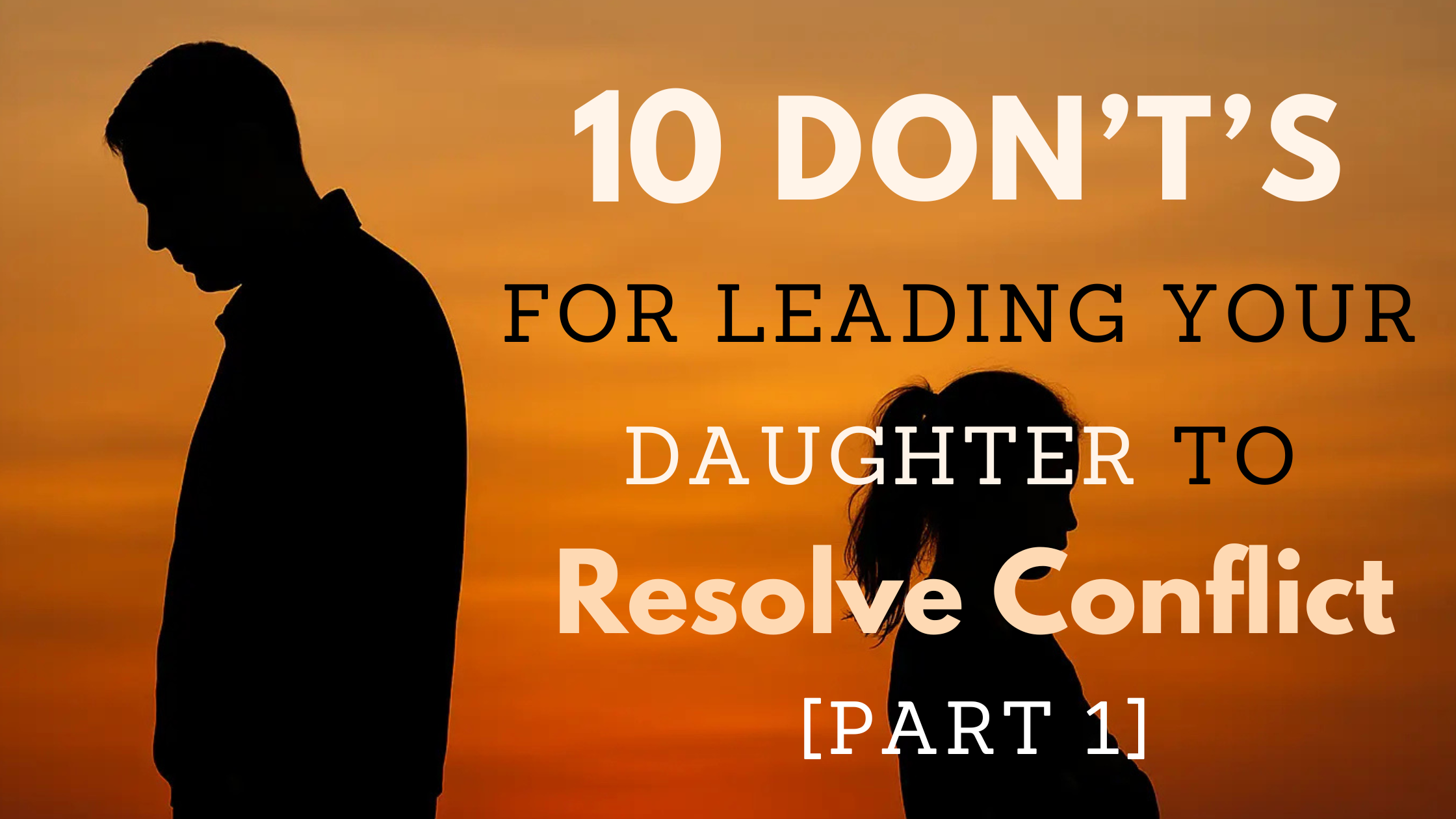10 Don’t’s for Leading Your Daughter to Resolve Conflict
Michelle Watson
We all know that being good at resolving conflict is not easy. Do I hear an “amen”?!
The reality is that being competent at resolving conflict is a learned skill, not something we’re innately wired to do.
Of course there are certain personalities that tend to run hot (which can be tied to individual wiring, trauma triggers, birth order, etc.), yet we all can benefit from a refresher course in strengthening our base when it comes to being more proactive and less reactive when it comes to handling conflicts and disagreements. Are you with me?!
As a GirlDad, you clearly know that more is caught than taught. So as you model what it looks like to be a conflict-resolver, your daughter will grow along with you. And the more you’re able to de-escalate the situation by regulating and calming your own nervous system responses, the more peace there will be in and with your daughter.
Today I’m sharing 10 things NOT to do to increase the likelihood of a positive resolution with your daughter when it comes to conflict resolution. This will help in your relationship with her, and also as you help her resolve conflicts with siblings and friends.
Then in in two weeks I’ll give you the other side with 10 things TO DO to resolve conflict with your daughter. (I’ll attach a pdf next time so you can copy it off and put it in a prominent place to remind you of these truths).
10 DON’T’s for Leading Your Daughter to Resolve Conflicts:
DON’T raise your voice and escalate by yelling. (If you don’t want her to raise her voice, scream, swear, rage, come unhinged, etc., then you must lead the way by refusing to engage in any of these behaviors first).
DON’T fire words at her, coupled with intense emotion in an attempt to gain control of her and/or the situation. (Set a time limit with yourself--even now--and practice being self-aware as to when it’s wisdom to take a break. When you control yourself, you’re positively helping to resolve the conflict by decreasing the flow of reactivity).
DON’T disrespect her while demanding that she respect you. (This one is tricky because you obviously have to intervene if there’s harm to herself or others, and there needs to be an intervention. But as a rule, be mindful of modeling respect, which includes honoring her ‘no’ and negotiating a later conversation after you’ve both calmed down).
DON’T forget that she will follow your example. (This goes both ways---positive and negative. It’s called “Laws of the Harvest” where you reap what you sow in her life. The more you water the soil of her heart with consistent, nurturing deposits, the more she’ll grow and be full of life).
DON’T expect her to be the first to soften her tone and react right. (This is a hard one at times when you have to be the mature one when everything in you wants to react to her reaction. But it’s up to you to set the pace for relational health as you lead the way).
DON’T demand that she immediately respond to what you say or ask. (Remember that when her mid-brain is on fire and there’s upset and overwhelm, she needs time to cool off before she can listen or talk rationally).
DON’T walk away while shouting or reacting. (Let her know if you need to leave the room or the call, you will come back in “x” number of minutes so she is clear about your expectations and knows there will be an attempt at resolution later).
DON’T make fun of her for what she says or how she feels. (This is especially true if she makes no sense to you and her problems seems insignificant or invalid).
DON’T go it alone. (Allow yourself to ask for help, support, and input from other dads, other women who were once your daughter’s age, as well as a counselor, mentor or pastor).
DON’T believe the lie that you don’t matter when it comes to shaping your daughter’s life and identity. (This goes beyond the current conflict and serves as a reminder that with every difficult situation, there is an opportunity to go deeper relationally with your daughter.)
Dad, I know it’s never fun, pleasant, or easy to navigate conflict, especially when it’s with your daughter whom you love with all your heart. And because it’s a normal part of relational health to have disagreements, it’s all about learning how to positively work through things rather than avoiding conflict.
I trust this list of ‘DON’T’s’ serves to remind you during challenging moments that you can actually strengthen your relationship with your daughter and deepen your bond by how you proactively work through the situation to a positive resolution.
I’m cheering you on as you DECREASE YOUR DON’T’S when it comes to being a conflict resolver. And in two weeks you’ll get the DO’s list…so be sure to follow along for Part 2. Go Dad!
